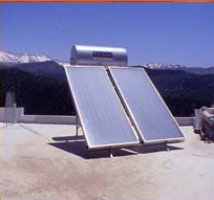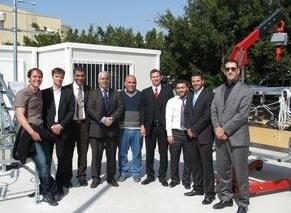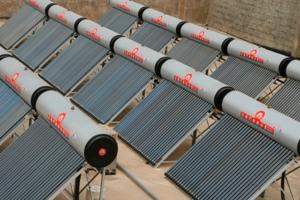Lebanon: Performance of a Solar Water Heater – a Case Study
November 24, 2009
Solar water heaters in Lebanon
 Solar water heaters are still rarely seen on Lebanese roofs. The Lebanese Centre for Energy Conservation Project (LCECP) has now published the promising results of a study about the performance of one particular residential solar water heating system in South Lebanon.
Solar water heaters are still rarely seen on Lebanese roofs. The Lebanese Centre for Energy Conservation Project (LCECP) has now published the promising results of a study about the performance of one particular residential solar water heating system in South Lebanon.
Photo: http://www.solec.org
In 2003, the government of the People’s Republic of China donated 500 solar water heater systems to the Lebanese government in form of an aid package to support South Lebanon. The Lebanese Centre for Energy Conservation Project (LCECP) was responsible for installing the systems in South Lebanon and the Ministry of Energy and Water for providing training workshops, making out beneficiaries and establishing pilot installations used for future monitoring. In order to publish performance results for awareness raising, LCECP decided to observe one site in the Lebanese town of Marjeyoun that possessed a collector with evacuated tubes. The currently presented case study shows that the solar water heater system covered 98 % of the hot water demand during an entire year – saving 1,776 kWhel/a, or US$ 105 (see attached document).
Five people are living in the two-bathroom, 100 m² house in Marjeyoun. The vacuum tube collector with a storage capacity of 208 litres and a 2 kW auxiliary electric heater was installed here in 2006. The entire household had to pay US$ 250 for the solar system and another US$ 200 for hoisting the existing water tank onto the roof.
The study’s results show a total annual hot water consumption of 64.5 m³ of the household, which is 12.9 m³ per person. These figures correspond with a daily hot water consumption of 35 litres per person, which falls within international standards that include hot water consumption (30 to 60 litres per person and day).
The thermal energy consumed by heating the water was found to be 3,092 kWhth/a. 3,049 kWh stemmed from solar energy and only 43 kWh from the electric heater. The system was able to deliver the necessary amount of hot water between the months of April and October. In financial terms, the system saved the family 1,776 kWhel, or US$ 105 in one year. The family’s electricity consumption before the installation of the solar water heater was 4,200 kWhel/year, which translates into electricity savings of 42 %. “This is significantly higher than the expected savings of 21 % based on previous studies, which showed that 26.6 % of the residential electricity consumption is used to heat water,“ the study states.
The conclusions of the study’s authors are very promising: “Solar water systems will save a significant amount of energy in the summer months when electric loads are at a maximum, shave off demand peaks during these times and eliminate the need for further investments into the electricity sector. In figures: A number of around 290,000 solar water heating systems will be necessary to outweigh the need for a 100 MW power plant (876 GWh/year, without accounting for grid losses).
The Lebanese Centre of Energy Conservation Project is assisting the Lebanese government in promoting solar water heater systems in the Lebanese market. It also lends a helping hand when it comes to marketing, awareness raising, policies and regulations. It provides free, practical advice for business and public sector organisations, with the goal to decrease the use of energy. The centre was founded in 2002 by the Global Environmental Facility (GEF). It is managed by the United Nations Development Programme (UNDP) and its instructions are directly executed by the Lebanese Ministry of Energy and Water.
More information:
http://www.lcecp.org.lb/
Text was written by communication specialist Hanna Schober based in South Africa. Schober@solrico.com


